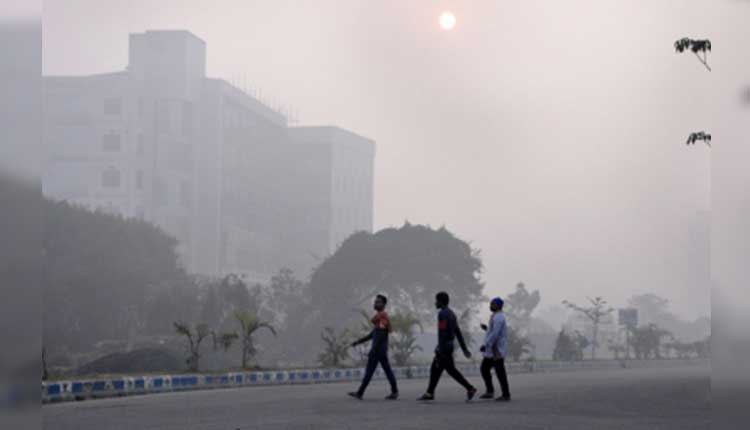New Delhi: Air pollution is one of the country’s key environmental concerns. Large cities, such as New Delhi, are constantly subjected to significant amounts of air pollution.
According to a travel advisory issued by International SOS, “Fine particulate matter (PM2.5) from transportation sources is the major contaminant. Non-vehicular causes of pollution in Delhi and neighbouring states include the burning of construction dust, garbage, and tyres. New Delhi is one of the world’s most polluted cities. PM2.5 levels are at least 15 times higher than the WHO air quality standards. Growth in several areas, including manufacturing, transportation, power generation, and building, has contributed to a worsening in air quality in other parts of India.”
On the occasion of World Health Day, IANSlife spoke with Dr. Vikram Vora, the Medical Director of International SOS in the Indian Subcontinent, to learn more about air pollution, how it affects individuals, and what can be done to mitigate the situation.
Read Excerpt:
How does air pollution impact public health?
Dr. Vikram: Air pollution is a growing cause of concern in public health as it impacts individuals as well as communities in which they live and interact. Over 90 per cent of the world’s population today, breathes polluted air.
Besides the most visible impact on respiratory health (shortness of breath, chronic cough, decrease in lung functional capacity), it also impacts cardiovascular health (increased incidence of stroke and heart attacks due to intravascular inflammation that damages blood vessels). Another serious impact that is being increasingly seen is the rise in cancer cases due to pollutants. These can be resistant to treatment and bear the potential to adversely affect mortality figures in affected populations.
What is most worrying is that the impact is not restricted to any particular demography – detrimental effects on reproductive and developmental health (decreased fertility, low birth weight), cognition, behaviour, and outcomes (dementia and early death) transcend all age groups.
The resulting increase in healthcare costs and sickness absenteeism that affects productivity can cause large-scale social and economic disturbances in populations.
What are the various factors that one needs to take to safeguard themselves?
Dr. Vikram: Awareness and appropriate action are key to safeguarding oneself. Having an active threat perception is the first step against air pollution. While it is well known (and unfortunately accepted) that the air quality during winter months in northern India is poor, many in other parts of the country were taken by surprise to learn that the Air Quality Index (AQI) in cities like Mumbai actually surpassed that of Delhi this year. Staying informed is crucial.
Limiting exposure to air pollution by avoiding outdoor exercise and staying indoors with windows closed, on days with lower air quality can help. Using air purifiers indoors improves the air quality in homes, offices, and other enclosed spaces. Avoid using incense sticks, floor cleaners with harsh chemicals, and aerosol-based room fresheners. Wearing a mask like the N95, which filters out the harmful suspended particulate matter is a good practice. If one must step out for any reason, preferring public transport can decrease exposure and help to avoid adding to the existing pollution.
Lastly and possibly most importantly, getting a routine health check annually, especially if one is above 40 years of age or has any chronic conditions like high blood pressure, heart disease, chronic respiratory illness, etc. works as an early warning system and prevents serious health complications.
How can employers help curtail the impact of air pollutants?
Dr. Vikram: Employers and organisations would do well to remember that air pollution not only impacts the health and well-being of their employees but also has profound effects on productivity and can lead to economic losses.
Organisations with good Duty of Care practices need to lead the way in showing other employers that air pollution can be controlled if the right steps enumerated below are taken:
Develop policies and procedures to encourage responsible environmental practices like reducing waste generation, promoting recycling, and cutting down on energy consumption
Create awareness among employees about the health risks associated with air pollution
Ensure adequate ventilation in all workspaces with modern, low-energy, and high-efficiency ventilation systems that adhere to domestic and international standards
Provide air purifiers in offices that can be operated on days when air quality is poor
For employees working in areas of higher pollution or outdoors, provide personal protective equipment (PPE) such as face masks with adequate breaks
An annual health check for employees is strongly recommended
On days of severe impairment in AQI, allow employees to work remotely so that travel and consequent increase in vehicular pollution can be avoided
Encourage employees to use public transport or carpool, using low-pollution transport like electric vehicles
How is productivity impacted due to air pollution?
Dr. Vikram: It is now well known that air pollution reduces productivity a recent study from China found that for a 10-point change in AQI, worker productivity fell by 4%. Exposure to air pollution causes respiratory problems like bronchitis and worsening of asthma, which decreases productivity due to absenteeism. Breathing polluted air can cause chronic fatigue, leading to lowered work performance. Poor indoor air quality can result in “sick building syndrome”, a condition where employees experience headaches, fatigue, and respiratory problems while at work.
Some of the impacts are directly related to a decline in mental well-being. Research shows that air pollution causes changes in the human brain, with 5 per cent of studies showing physical and functional changes in the emotion-regulating parts. This can make people more susceptible to mental health and well-being issues. Some of the manifestations are:
A decline in cognitive function affects memory, attention, and decision-making.
Increased stress and anxiety
Reduced creativity
Lower levels of innovation
Is there an example or particular rules that organisations now provide to their employees?
Dr. Vikram: While there are guidelines for organisations to follow to affect a reduction in their emissions and carbon footprint, there needs to be a conscious effort made to percolate best practices and inculcate environment-friendly behaviours among employees as well. Some organisations do this well (with documented environmental policies) while some are struggling to maintain the balance between economic and social responsibilities.
Many companies today employ those who live closer to the work location or allow employees to work from home. Some offer pooled company transport or encourage carpooling to reduce air pollution.
Even within offices, a paperless environment is encouraged to reduce waste. Recycling is now common.
State-of-the-art HVAC systems with high filtration and air purification capabilities are deployed with frequent air changes. PPEs are being provided to employees with higher risk.
Many organisations are ensuring that the workforce is equipped with updated health information from credible sources and issue health advisories against air pollution whenever required, enabling employees to make informed decisions. Regular health checks have been started for all employees, which are tailored for maximum efficiency and not just as a tick on a checkbox.
Air pollution will continue to be a growing threat to employee well-being for the foreseeable future. How we address this threat both individually and collectively will determine how future generations live and thrive.
(IANS)













